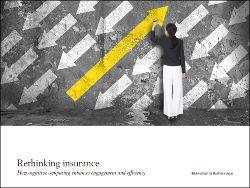Ungated Post | 07 Feb 2017
Rethinking insurance: How cognitive computing enhances engagement and efficiency

Oxford Economics worked with IBM’s Institute for Business Value in mid-2016 to field a survey among 1,502 C-suite executives in a range of roles around the world. As the cognitive era dawns, outperformers in the industry are rethinking insurance by applying technologies that understand, reason, learn and interact to improve the way insurers do business.
For success in the digital age, insurers must tap the hidden treasure they already own in massive quantities: data. They need to be able to scrutinize internal and external data sets, many of which have not been digitally accessible. IBM’s 2016 Cognitive Insurance Survey identified a lack of internal agility and the threat of outside disruption as major industry challenges requiring urgent responses. We categorized insurers based on revenue growth and operating efficiency over the past three years to allow a comparison of strong performers with others in the industry. While many organizations still have far to go, outperformers are already taking strides to become fully fledged cognitive insurers.
Oxford Economics’ team is expert at applying advanced economic tools that provide valuable insights into today’s most pressing business, financial, and policy issues.
Related Services

Post
The Economic Contribution of Mexico’s Audiovisual Industry
This report demonstrates the integral role that the AV industry plays in Mexico's economy by estimating the industry’s domestic economic footprint. The analysis comprises all aspects of the audiovisual industry, including film production, distribution, and exhibition; the production, distribution, and broadcast of television content on free-to-air and pay TV channels; and online video platforms. Our estimates provide a recent snapshot of the audiovisual industry, including impacts at the broader industry level and broken out by sub-sector.
Find Out More
Post
The socio-economic impact of TikTok in Australia
This report provides the results of our economic modelling of TikTok’s economic contribution to the Australian economy, as well as the findings of survey research into TikTok’s users and Australian businesses. It looks at the real world impacts users report as well as the diversity of TikTok’s online communities.
Find Out More
Post
The German Music Industry: Investments and Payments to Artists
Our study "The German Music Industry: Investments and Payments to Artists", on behalf of the German Music Industry Association (BVMI), examines whether and how artists have benefited from the increased revenues of German music labels in recent years.
Find Out More